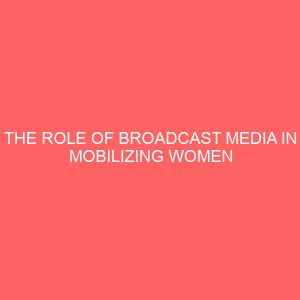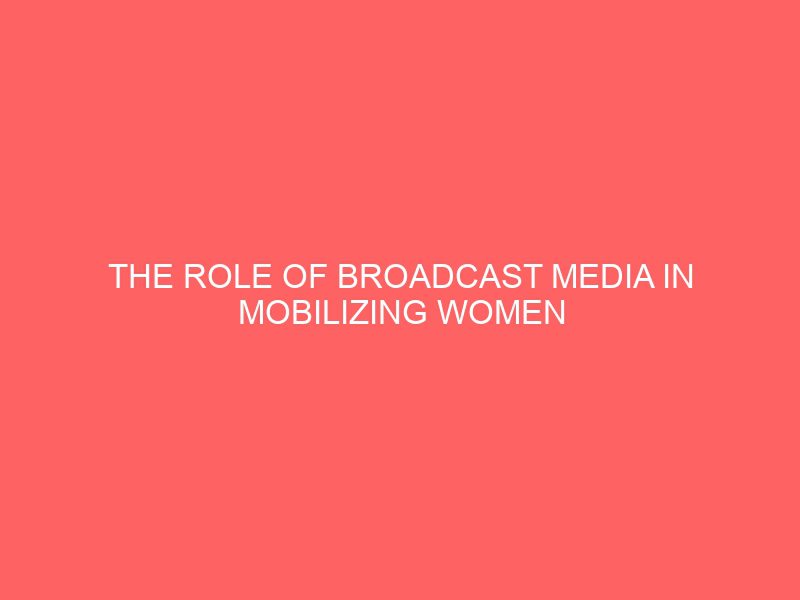Description
ABSTRACT
The low rate of female participation in politics compared to that of their male counter parts in Nigeria creates a need to examine the situation in this study, The role of broadcast media in mobilizing women for political participation in Nigeria. This study examines the problems, first, defining the importance of women to participate in politics. The survey research method was employed in this study and questionnaires were used for data collection, then the hypothesis was tested using chi-square statistical procedure to reach a definite conclusion. The results reflect that broadcast media have positive impact in mobilizing women to participate in politics. In summary, broadcast media is found wanting in fostering development for gender equality in politics. In recommendations, suggestion of ways to stimulate female participation was made by looking at practical examples of how this was done in the precolonial era. Finally, in conclusion, the study emphasizes that no sex or gender is more important than the other because in politics, intellectual ability counts more than physical energy.
CHAPTER ONE
1.0 INTRODUCTION
1.1 BACKGROUND OF THE STUDY
Women constitute a critical segment of the Nigeria population. They are active in the agriculture and economic sectors of the society and have also contributed immensely to the decolonization and general development of this great country.
Women struggles date back to the 19th century when women like Amina of Zaria, Madam Tinubu of Lagos, Olufuamilayo Ransom Kute of Abeokuta, Margaret Ekpo and Hajji Gabon Swabia among others fought to give women the pride of place in Nigeria’s history even after the struggle for independence was over and Nigeria became an independent soveign nation, women continued to contribute their quota in the post independence match towards development and progress. In the areas of politics, the above named amongst others contributed immensely to the mobilization and sensitization of women with a view to ensuring that women are involved in the politics of the country.
At present, the issues pertaining to women have contributed to draw a global attention with the result that the problems that impede their progress are currently being addressed concretely. Consequently, the crusted for women empowerment has heightened the political consciousness of women. Some of them occupy strategic positions in government where they have continued to prove their mettle. For instance Dora Akunyili, Oby Ezekwesili of Due process Fame, Ndi Okereke Onyilike and Ngozi Okonji Iweala among others has undoubtedly distinguished themselves in their official assignments.
The role of women in development has for a long been taken for granted and relegated to the back ground. For a long time, politics in Nigeria has been played with the usual patronizing attitude which usually does not go far in enlightening women. Some of the factors employed are social and cultural practices which hither to have been misinterpreted to create biases against women. There is need for women to be properly oriented so that their numerical strength and voting power can be profitably galvanized and oriented towards empowerment of other women who will in turn look after the welfare of all women by formulating gender sensitive laws to promote women’s cause.
What is really the meaning of politics Various scholars resulting in different views of politics have defined it as the art of possible, a game of wits, all that begins and ends with government. Politics is essentially the art and science of government. That is, the study of the control, distribution and use of power over human activities in society.
The word politics is derived from the Greek word Polis, which means city state. Winter and bellows 1968 pointed out that Aristotle 384322 Bc in his treatise on human associations stated that the most sovereign inclusive association is the polis which presupposes the establishment of government, law making, enforcement and eliciting obedience from the members of the society. Aristotle observed that man is by nature, political animal. This means that politics permeates all human activities. It manifests in social, economic and cultural intersections among individual and groups and transcends international frontiers.
The obvious maneuver associated with the concept and practice of politics influenced the emergence of the Laswellian theory of politics, which states that politics is who gets what and how Laswellian, 1958.
The Nairobi world conference to review and appraise the achievements of the UN Decade for women in 1985, and the Beijing fourth world conference on women in 1995, both had top on their agenda issues concerning women and the media. These conference brought to the fore the importance of the media in the quest for gender equity in development, despite their international conferences and polices aimed at gender friendliness however, women’s participation in Nigerian politics is undermined by the way the media represents politics as an exclusively male domain.
Contemporary experiences have shown that broad cast media is important to the political development of nations. Broadcast is not only a means of teaching, sensitizing and transmitting message on issues of development, but also crucial to the process of development. Considering the fact that broadcast is increasingly being used worldwide with its power of reaching a large mass of audience, it should not be ignored in the political scheme of things. This might account for why Nwankwo 1996: XI said that, one vital factor in the pursuit of gender equality in politics is the media.
The aim here is not just to critically analyze the impact of broadcast media in the quest for a gender equitable polity, but to also turn the searchlight of feminists and media scholars to broadcast with regard to gender and politics. Thus, the focus is on the gender dimension of broadcast and the quest for a gender equitable polity.
It is here posited that broadcast media could significantly influence the acceleration and acceptable of women in politics.
1.2 STATEMENT OF RESEARCH PROBLEM
It is not a hidden fact that women are under represented in the field of politics. This may be because of the basic assumption that a women’s place is in the kitchen. In other words, her home duties and family responsibilities should be her sole priority, thereby underling her active participation in national development in general.
Another assumption militating against female participation is that, female is biologically not designed for energy exerting and hazardous occupation. This argument may not be true because, with the age of automation and revolution in decision making intellectual ability counts more than physical energy.








Reviews
There are no reviews yet.